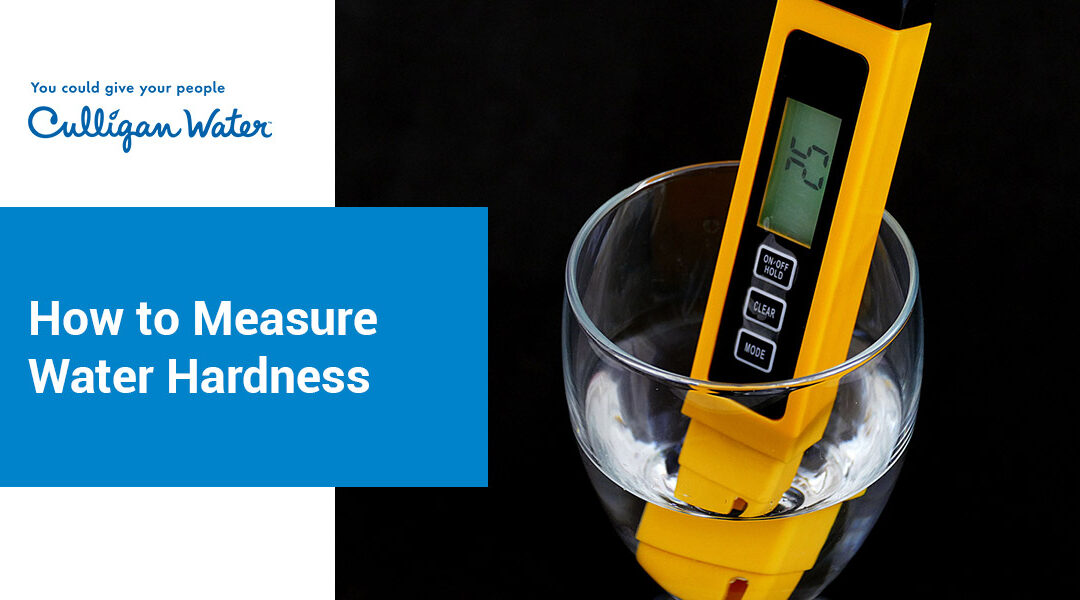Table of Contents
The state of your home’s water will determine the life span of your water-based appliances, the cleanliness of your laundry and the level of agitation soap will need to foam properly. When the water in your home is giving you issues with these aspects, you may need to check to see if you have hard water. Hard water is a type of water with a particular concentration of calcium and magnesium, or calcium carbonate, that can affect your plumbing.
We will walk you through what hard water is, what it does, how to test for it and how a process called water softening can help you adjust your water’s hardness.
How Is Water Hardness Measured?
Water hardness is usually measured with two units of measurement — parts per million (ppm) and grains per gallon (gpg). Ppm tells you how many units of calcium and magnesium there are in a million units of water. This unit of measurement is equivalent to milligrams per liter, which is how individuals measure their water hardness in Canada and other areas where the metric system is preferred.
The second unit of measurement is grains per gallon of calcium carbonate. This is the most common water hardness measurement, and 1 gpg is equivalent to 17.14 ppm. Water hardness measurements are important because a water softener has to correspond to the severity of your hard water level in order to be effective at filtering the calcium carbonate.
Water softeners are mechanisms that consist of two tanks, the main tank and the brine tank. The main tank is filled with tiny resin beads, which clean your water by adhering to the calcium carbonate particles and making your water soft. After a while, the tank has to be cleaned, or regenerated, with a saltwater solution that stays in the brine tank. The sodium in the special solution flushes out the buildup of the calcium carbonate from the resin beads, preparing them to soften your water all over again.
The abilities of water softeners are measured by two units — grain capacity and salt efficiency. The grain capacity tells you how much calcium carbonate the softener can filter out in an ideal situation before needing regeneration. Salt efficiency is a more accurate measurement that tells you how many pounds of salt are needed per grain of calcium carbonate.
What Are the Levels of the Water Hardness Scale?
You need to know what level of hard water your home has before buying a water softener so that you can ensure you are using the correct amount of salt. The hardness scale for water usually follows this general range:
- Soft: Less than 1 gpg.
- Slightly hard: 1 to 3.5 gpg.
- Moderately hard: 3.5 to 7 gpg.
- Hard: 7 to 10 gpg.
- Very hard: More than 10.5 gpg.
The acceptable hardness of water is between soft and slightly hard. If your water is anywhere else on the scale, it’s time to seriously consider getting a water softener. Hard water is more than just an inconvenience. It can cause damage to your appliances like your dishwasher or washing machine, damage to your skin and hair, and unclean laundry. Hard water can also create costly problems with water heaters, boilers and cooling towers in industrial settings.
You can feel and see the improvement when your water is soft. Some benefits include shiny dishes, better soap agitation that leaves your skin smoother and cleaner loads of laundry. You can also avoid pricey visits from plumbers by eliminating the potential of a problem altogether.
How Can You Test Your Home’s Hard Water Level?
If you notice an increasing buildup of limescale and soap scum on your showerheads or other water equipment, as well as less foaminess when you try and wash your hands, you should test your water for its hardness level.
There are various hard water testing options at your disposal through water treatment professionals. You can either pay for a lab test or request a free field test for accurate readings of your hard water levels. City residents may have information available about their area’s general hard water levels, but they aren’t as accurate and won’t tell you much about your specific residence. Rural residents often get water from wells, making it necessary to test its hardness regardless.
When you receive your results, the professional company can assist you with buying and installing the right water softener for your home.
Contact Culligan Water for Hard Water Solutions
If you have recently noticed the effects of hard water, act now to make sure you eliminate the problem before it results in more serious issues. Contact us to conduct your free hard water testing, and we will work with you to find the right solution for your specific needs!

